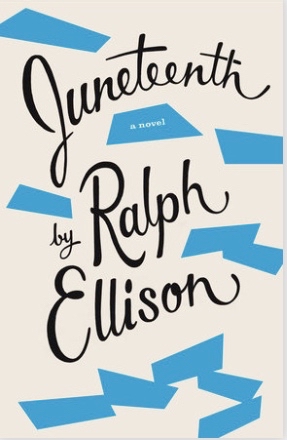By Gail Picco (June 19, 2020)
Juneteenth, Ralph Ellison with preface by Charles Johnson, Vintage International, 408 pp., Kindle, $13.99
Juneteenth by Ralph Ellison was published posthumously and takes its name from the day Union Army General Gordon Granger led troops to Galveston, Texas to announce the end of the Civil War and give the order to end slavery, June 19, 1865.
Ralph Ellison was one of the greatest writers of the 20th century. His first full novel Invisible Man is one of the best books of the 20th century, but Juneteenth received no such universal praise.
Born in 1914 in Oklahoma City, Oklahoma, the grandson of slaves. Ellison and his younger brother were raised by a single mother whose father died when Ellison was three years old. In 1921, mobs of white people in Tulsa, Oklahoma, just one hundred miles 100 miles southwest of Oklahoma City, killed 300 Black people when they burned the 35 blocks of a prosperous black area known as the Black Wall Street to the ground, Ellison would have been seven years old. He trained as a musician at Tuskegee Institute, but became a writer after coming under the influence of his friend, Richard Wright. Invisible Man was published to national and international acclaim in 1952, and there was a great expectation of what would come next. But the following 40 years found Ellison having trouble producing another novel. He focused on short form writing and teaching, and faced criticism by some for his lack of output and circle of friends.
His biographer Arnold Rampersad was “dismayed by Ellison’s infatuation with the white world of exclusive clubs, his need to mingle with the socially prominent and politically connected, and his tentative relationship to the civil rights movement,” said New York Times book critic, William Grimes in 2007.
But, in 2012 on the anniversary of Invisible Man, New Yorker writer, David Denby, struck back,
“What I want to say on the anniversary of “Invisible Man” is that everyone should get off Ellison’s back. Just get off his back. Stop lamenting what he didn’t do and celebrate what he did do—which was to create a work of art that, as it happens, has never been more “relevant” than now.”
Juneteenth was published posthumously and takes its name from the day Union Army General Gordon Granger led troops to Galveston, Texas to announce the end of the Civil War and give the order to end slavery, June 19, 1865. The anniversary of the days Union Army General Granger arrived in Galveston has been celebrated by African-Americans for decades. The Exclamation Proclamation, in part read,
“That on the first day of January, in the year of our Lord one thousand eight hundred and sixty-three, all persons held as slaves within any State or designated part of a State, the people whereof shall then be in rebellion against the United States, shall be then, thenceforward, and forever free…
It became a state holiday in Texas in 1980. Many states followed suit.
The novel’s premise is that an orphaned white boy, Bliss Hickman, is adopted by a kindly parish of Black Americans led by Reverend Hickman, who Bliss calls Daddy Hickman. Bliss Hickman grows up to be a senator named Adam Sunraider. Reverend Hickman and the parish go to see the senator and are sitting in the Visitor’s Gallery of the Senate as Sunraider is giving a horrifically racist monologue. During the monologue, an unnamed Black man shoots the senator and then dies by falling over the Galley railing as he tries to escape. Reverend Hickman is shocked. His adopted son has somehow transformed into a virulent racist and has now been shot on the floor of the Senate. Sunraider, who has barely survived the shooting, is on his deathbed and calling for Daddy Hickman.
“Tell me what happened while there’s still time,” demands the dying Senator Adam Sunraider of Reverend Hickman.
Soon both men are sleeping in the same hospital room and the novel becomes a series of flashbacks, culminating in a shocking conclusion.
One remembrance of Reverend Hickman is preaching on Juneteenth,
“On this God-given day, brothers and sisters, when we have come together to praise God and celebrate our oneness, our slipping off the chains, let us begin this week of worship by taking a look at the ledger. Let us, on this day of deliverance, take a look at the figures writ on our bodies and on the living tablet of our heart. The Hebrew children have their Passover so that they can keep their history alive in their memories—so let us take one more page from their book and, on this great day of deliverance, on this day of emancipation, let’s us tell ourselves our story…”
Ralph Ellison died in 1994, before this second novel was finished, the second novel he had been working on for more than 40 years. There were more than 2,000 pages in various stages of completion when literary executor John Callahan tried to assemble it into a coherent whole. Not all reviewers were kind when the book was published in 1999.
James Wood wrote for The Guardian, “[Callahan] has taken what he sees as the most coherent and central episode from Ellison’s manuscripts, and presented it as a single work … [but] Juneteenth is decidedly not a novel: it lacks a novel’s shape, rationale, and self-justifying propulsion.
“It is possible that Ellison’s project, which was vast – a many-eyed attempt to see the entirety of post-war American society – had become unrealisable, and that Ellison, always an exquisitely sensitive craftsman, knew this. It seems the best explanation for Ellison’s 40-year inability to publish a complete second novel.”
“Good fiction is made of that which is real,’ Ellison once said, “and reality is difficult to come by.”
Gail Picco is the Editor in Chief of The Charity Report.

Leave a Reply
You must be logged in to post a comment.